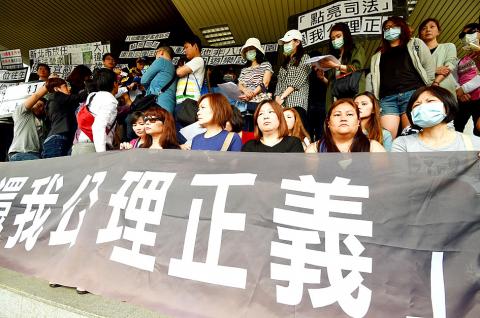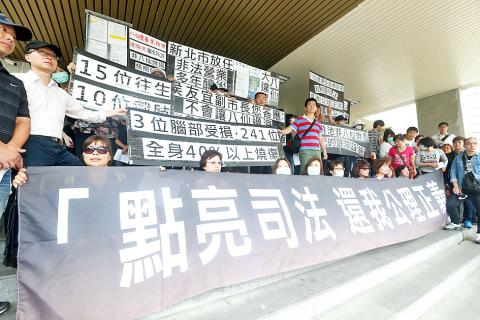The Shilin District Court yesterday found event organizer Lu Chung-chi (呂忠吉) guilty of professional negligence in causing deaths in the Formosa Fun Coast (八仙樂園) water park disaster on June 27 last year, sentencing him to four years and 10 months in prison.
The ruling, the first verdict on the disaster, sparked furious reactions from people affected by the inferno, who said the sentence was too lenient considering the enormity of the catastrophy.
Fifteen people of the 508 injured in the blaze that swept through a Color Play Asia party at the park died as a result of their injuries. More than 200 sustained serious injuries, and many of them are still in pain, fighting for recovery and requiring medical treatment and daily rehabilitation work.

Photo: Lo Pei-der, Taipei Times
Most of those who sustained injuries were between the ages of 18 and 25, when they attended the event organized by Lu, proprietor of Color Play Co (玩色創意) and Juipo International Marketing Co (瑞博國際整合行銷), who rented out facilities at the park in New Taipei City’s Bali District (八里).
Lu did not appear in court for yesterday’s ruling.
His lawyer, Chen Chun-wei (陳君瑋), said “the sentence was too heavy.”

Photo: CNA
“After receiving the official court statement, I will discuss it with Lu. We will certainly appeal this decision,” Chen said.
A group of about 50 people, members of a self-help association, along with relatives and supporters, demonstrated outside the Shilin District Court in Taipei, while some attended the court session to hear the ruling.
They held up banners that read: “We Want Justice” and placards that demanded that the judiciary investigate possible negligence on the part of the New Taipei City Government and the company that owns the water park.
Lee Meng-hsiu (李孟修), who sustained second and third-degree burns to more than 70 percent of his body and is still fighting to recover, said the sentence was far too lenient.
“I felt heavy-hearted when I heard the ruling. I am disappointed at Taiwan’s justice system,” he said.
The father of Liu Chih-wei (劉致葦), who died in the disaster, said he was “disgusted” by the ruling.
“Lu is responsible for the deaths of 15 young people and more than 400 injured people, but for 15 lives, he only got less than a five-year term. In our nation, human lives seem to be worth less than dogs’,” he said.
“I will be talking to our lawyers. We must appeal, because we want justice to be served,” he said.
Association for Victims Support in Taiwan executive Wang Yu-hsiu (王鈺琇) said the nation’s judiciary too often gives convicted criminals light punishments.
“Lu only has to serve a few years in jail, then he will be free, but who will bear the burden for more than 400 young people’s lifetime of pain and stigma after being disfigured by burns?” Wang said.
According to the Ministry of Health and Welfare data, 281 of the victims sustained burns that covered more than 40 percent of their bodies, including 41 people with burns to more than 80 percent of their bodies.
Three people were still hospitalized as of Monday, the ministry said.
As of December last year, the National Health Insurance program had paid more than NT$800 million (US$24.72 million) to cover the medical costs of burn patients from the disaster, the ministry said.
The National Health Insurance Administration has filed a lawsuit with the Shilin District Court to demand compensation of NT$436 million — the costs incurred during the first month after the accident — from Lu.
Additional reporting by CNA

Intelligence agents have recorded 510,000 instances of “controversial information” being spread online by the Chinese Communist Party (CCP) so far this year, the National Security Bureau (NSB) said in a report yesterday, as it warned of artificial intelligence (AI) being employed to generate destabilizing misinformation. The bureau submitted a written report to the Legislative Yuan in preparation for National Security Bureau Director-General Tsai Ming-yen’s (蔡明彥) appearance before the Foreign Affairs and National Defense Committee today. The CCP has been using cognitive warfare to divide Taiwanese society by commenting on controversial issues such as Taiwan Semiconductor Manufacturing Co’s (TSMC, 台積電) investments in the

INVESTIGATION: The case is the latest instance of a DPP figure being implicated in an espionage network accused of allegedly leaking information to Chinese intelligence Democratic Progressive Party (DPP) member Ho Jen-chieh (何仁傑) was detained and held incommunicado yesterday on suspicion of spying for China during his tenure as assistant to then-minister of foreign affairs Joseph Wu (吳釗燮). The Taipei District Prosecutors’ Office said Ho was implicated during its investigation into alleged spying activities by former Presidential Office consultant Wu Shang-yu (吳尚雨). Prosecutors said there is reason to believe Ho breached the National Security Act (國家安全法) by leaking classified Ministry of Foreign Affairs information to Chinese intelligence. Following interrogation, prosecutors petitioned the Taipei District Court to detain Ho, citing concerns over potential collusion or tampering of evidence. The

‘COMPREHENSIVE PLAN’: Lin Chia-lung said that the government was ready to talk about a variety of issues, including investment in and purchases from the US The National Stabilization Fund (NSF) yesterday announced that it would step in to staunch stock market losses for the ninth time in the nation’s history. An NSF board meeting, originally scheduled for Monday next week, was moved to yesterday after stocks plummeted in the wake of US President Donald Trump’s announcement of 32 percent tariffs on Taiwan on Wednesday last week. Board members voted to support the stock market with the NT$500 billion (US$15.15 billion) fund, with injections of funds to begin as soon as today. The NSF in 2000 injected NT$120 billion to stabilize stocks, the most ever. The lowest amount it

NEGOTIATIONS: Taiwan has good relations with Washington and the outlook for the negotiations looks promising, Minister of Economic Affairs J.W. Kuo said Taiwan’s GDP growth this year is expected to decrease by 0.43 to 1.61 percentage points due to the effects of US tariffs, National Development Council (NDC) Minister Paul Liu (劉鏡清) said at a meeting of the legislature’s Economics Committee in Taipei yesterday, citing a preliminary estimate by a private research institution. Taiwan’s economy would be significantly affected by the 32 percent “reciprocal” tariffs slapped by the US, which took effect yesterday, Liu said, adding that GDP growth could fall below 3 percent and potentially even dip below 2 percent to 1.53 percent this year. The council has commissioned another institution